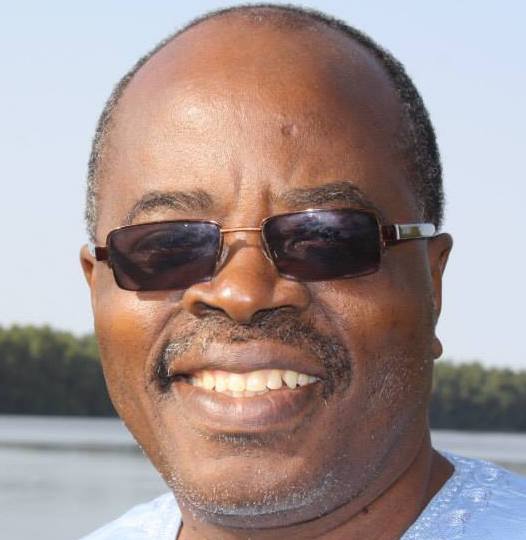Professor Ade Kukoyi was the first Nigerian to graduate with a Bachelors degree in French from the University of Ibadan (U.I.), the premier University in Nigeria. In fact, he was in the first set of students admitted into U.I. in the 1962-63 session when the University that was an affiliate of the University of London and known as the University College, Ibadan from 1948-1962 acquired its autonomy under a Nigerian Act after Independence.
July 3 was the 80th birthday anniversary of Professor Adebola Kukoyi. The Yoruba or better still, the Ijebu sub-group, tended to have loud “owambes” (literally: it’s there i.e., the party is rich in all respects: attendance, loud live-bands, food and drinks, elegant competitive dressing: including in uniformed fabric with diverse designs), to mark landmark birthdays. These tend to be at ages: 21, 40, 50, 60, 70, 80, 90 and 100. With the Nigerian average life-span at 55 years, there is an excitement about making it to be 80 years old. After all, Nigeria’s life span is only better than those of Sierra Leone, Chad and the Central African Republic. War-torn Somalia (58), Afghanistan (65), not to talk of Syria (73) years beat Nigeria pants down. Some other time, the analysis on the quality of life in Nigeria would be very interesting. The UNDP’s Human Development Index (HDI) that I once participated in putting together over a two-year period (1993 and 1994) would surprise Nigerians who, as the great Fela Anikulapo Kuti puts it, are always suffering and smiling.
I was a bit reticent when my “egbon” (big brother that does not necessarily reflect blood relationship but a closeness that is similar) sent out a text message on June 26 that read: “By the Grace of God, I hope to clock 80 yrs on July 3rd, 2020. Owing to the current situation in place, we intend to celebrate the occasion on a low key: we will just keep an “open house” for all-comers on the appointed date. All guests may come in at will to celebrate with the family”. Social distancing (really physical distancing since today, unlike during the 1918-20 Spanish flu when the term was coined, we remain very socially connected even when we are not in close proximity) has been decreed as a result of COVID-19. But I knew I could not but be at the scaled down party. The reasons are just too many to elaborate here. Without COVID-19 ravaging the world, we would have taken a big hall with real Ijebu Owambe display, that is not the style of the celebrant, but which his two wives and children and conspirators like myself would have ensured.
Professor Ade Kukoyi was the first Nigerian to graduate with a Bachelors degree in French from the University of Ibadan (U.I.), the premier University in Nigeria. In fact, he was in the first set of students admitted into U.I. in the 1962-63 session when the University that was an affiliate of the University of London and known as the University College, Ibadan from 1948-1962 acquired its autonomy under a Nigerian Act after Independence. Chief Olorode, his contemporary told us that Ade Kukoyi was a lone student taught by a French lecturer in their student days. With a lot of nostalgia, he recounted the opulence with which students were pampered as leadership was being built for our newly independent country. Each person had a room and could bring in friends to eat for free and even stay over. Since then, the standards have consistently spiraled downwards. The leaders of today would rather, aside from outright looting, vote more to the legislature to further share among themselves and minimally allocate for health and education for the country. They typically jet out to get medical care for the most basic health concerns, and now pretend to be completely shocked with COVID-19 exposing the real state of our healthcare infrastructures.
The birthday party had started at 11:00 a.m with a religious service steered by some clergy that included the current vice-chancellor of the University of Lagos (UNILAG), Professor Toyin Ogundipe. I met the end of the service. We, (Professor Funso Akere and Dr. Moses Ajaja), as retired Commodore Adebola Abegunde took his leave (members of Magodo Associates), thereafter joined the more interesting part of the day’s festivity.
About 20 of us moved into the big living room of Kukoyi’s mansion, to join several others from different parts of the world for a zoom meeting of tributes and subsequently engage in the passion of Magodo Associates: Dialogue on the state of the Nigerian nation-state. The highlight of the tributes was a video presentation by the University of Lagos Cricket Alumni Association after an introductory tribute by retired Group Captain Eso who had entered secondary school with the celebrant in 1954. I am not a sports enthusiast. Professor Dunera Ilako (Kenya) and Retired Major-General Muhammed Tahir (Pakistan) as friends had differently tried to explain cricket to me. I couldn’t get it. In retirement, my egbon and retired Group Captain Eso had taken me to a West African Cricket competition in Lagos. I sat through it but enjoyed the finger foods, as well as my engagement with Ayanti Udoma, a keen Cricketer of yore, as we discussed on politics and the deception of the ruling “party” in Nigeria, with respect to a manifesto that had promised change and eradication of corruption etc., but with very little, if anything at all, on delivery.
I learnt a lot on the contribution of how a more youth engagement got Professor Kukoyi interested in cricket from 1966 to 2005, as he went through his lecturing career at the University of Lagos. Serving as team manager, he spurred the Unilag Cricket team to win many laurels in Nigeria and beyond. It must be gratifying to him when the representatives of the 102-member Unilag Cricket Alumni gave a cheque of appreciation to him for his past role and announced that they are reconstructing the cricket pitch at Unilag to be named after him.
The political discussion that followed saw me submit that Nigeria’s so-called democracy is better called a lootocracy and the so-called political “parties” are best referred to as Alliances of Thieves. The dialogue modified the latter name to Alliances of Robbers. I had over the last three years detailed the art of massive looting of the national patrimony as governance. The Alliances of Robbers have had a unity of purpose on such looting. In fact, the chairman of a branch of the national robbers did say that if someone is a thief but joins his side of the den of robbers, his/her sins would be forgiven. They are able to move from one side of the Alliances to the other with ease.
We spent reasonable time on the impending selection process (called electoral contest) going on in Edo State of Nigeria. In the 2016 elections, Godwin Obaseki was the flag bearer of the All Progressives Congress (APC) and Osagie Ize-Iyamu was that of the Peoples Democratic Party (PDP). In the elections expected to take place later this month, the same dramatis personae are in competition but in different fractions of the Alliance of Robbers from the 2016 situation. Obaseki who won in 2016 as APC and remains in office is now competing on the platform of the PDP, as Ize-Iyamu has the ticket of the APC. There is no ideology. Manifestoes do not matter. What’s important is to be at the helms in our lootocracy. This is not new. Many national looters have been moving across “parties” as they like, in order to occupy political office as a way to loot more.
We could not agree on the need for a nascent movement being put forth by political careerists who had the audacity to suggest their dream as being patterned after Albert Luthuli and Nelson Mandela’s African National Congress. With some, I argued that nothing good is coming out of the new movement. But my older colleagues, in yearning for change, wanted the emerging movement to be given a chance towards institutionalising and hopefully giving the current alliance of robbers a run for their money. But curiously, we agreed that it would be difficult to find five persons of integrity among the 30 names being put forth as mis-leaders of the new “party”.
In 2018, these people rose in a similar manner ostensibly to form a movement to deliver Nigerians. In no time, they went into dialogue with former President Obasanjo’s movement, CNM, that I rushed to seek to join when I thought a formidable pressure group was in the making to demand accountability, only for President Obasanjo to move into forming a “party” that he also in no time abandoned to support his former deputy in the PDP, whose alliance of robbers had seen him into office twice but which he later swore never to be part of as he tore his membership card. These political careerists (since denounced by three or four of the people whose names had been used without consultation) as founders of the new National Consultative Front (NCF), think we lack memories. They speedily abandoned the fake ANC-like contraption and sought the highest possible posts to be selected for in the two more solid alliances of robbers. Some of them stole woefully and destroyed national investments that should have grown into major industrial entities today. But our media tend to be in amnesia also. They bury memories on past lootings as they parley with all aspirants into office using stolen money to acquire new seats on the table in our lootocracy. A shame that our media never asks questions on the origins of the riches being flaunted by our aspiring leaders.
The discussion on who is the Yoruba political leader was equally very spirited. For me, it may be a wrong assumption that the Yoruba need a political leader. Why must the Yoruba have a single leader? A leader with a mass-oriented policy once emerged. He built a social democratic party and ruled over the Yoruba heartland in a federal arrangement. He used state power for the interest of the larger population and invested in education, health and other infrastructure reaching people directly. He made it possible for people like myself to be educated and break out of poverty without stealing. Obafemi Awolowo of blessed memory did not hand-pick fellow thieves to be enriched with the hope that they would in turn employ and donate food to unempowered people who remain in abject poverty. He surrounded himself with lieutenants who died without any form of aggrandisement through the national patrimony. They used the minimal money available from cocoa, rubber, palm-kernels, etc (a fraction of what’s available to todays looters) to transform the Western Region of Nigeria. As a kid, I followed my mother to Oke-Owa river in Ijebu-Ode to fetch drinking water from a very long distance, until Awolowo’s government provided pipe-borne water that supplied a cluster of homes on each street and we queued to fetch water. I could go to distances from my home to watch and learn from television, in addition to listening regularly to the news on redifussion.
Awolowo, as minister of Finance in the Gowon administration, embarked on post-civil war Nigeria along similar lines for reconstruction and development, without the country borrowing to loot like many of todays’ mis-leaders are doing to such an extent that it is now being said that we are currently using 99 per cent of our revenue to service debts. $36 billion of external reserves is used to deceive us that we are financially in good shape, without an explanation on why we are borrowing so much more than the reserves. While coronavirus may be a factor in our downward spiral that should haunt us soon, the main problem is our profligacy in a lootocracy.
We ended our 8-hour birthday bash with a discussion on COVID-19, vaccines, depopulation of Africa, and genetically modified organisms (GMOs) in foods. I found myself, supported by a few, engaging the many fake news or “alternative facts”, surrounding these issues. The fetish and mis-placed focus on Bill Gates as the anti-christ with the 666, a vaccine merchant, etc., without appreciation of Bill and Melinda Gates Foundation’s roll back on malaria, as well as support to agriculture in Nigeria. These are kept off the arguments of Nigerians when they are searching for Bill Gates’ interest in Africa and his allegedly bribing legislators to vaccinate and/or implant microchips into our bodies.
Of course, others in the world who we are constantly begging for sustenance and debt-forgiveness have a right to be concerned about our child-bearing proclivities. A member of the Nigerian House of Representatives brought his four wives to the Assembly, sought permission to address, not on how to curb health issues but to announce that he is a solid man with the achievement of having 27 children, so far. Europeans have, through socialisation, ensured reasonable reduction in their population. If Africa wants to maintain its current population growth, it should show that it can sustain them. We have been taking vaccines for yellow fever, polio, TB, small pox etc. If we don’t trust the West on vaccine for coronavirus-2, why don’t we get our robber leaders to steal less of the national patrimony and pump more money into virology research to provide our own vaccines. We can even sell to the West once efficacy is proved. We should stop being part of old-wife’s tales of God, in a dream and/or trance, providing plants to them that would “cure” COVID-19.
We have professors on social media in Nigeria losing the empirical evidence-based orientation to knowledge that got them their respective professorships, joining in condemning the World Health Organisation (WHO) for not distributing Covid-Organics or succumb to charlatans who wanted to experiment with the lives of others with various herbs. Luckily, it is no longer WHO but the Nigerian Health minister who recently announced that Covid-Organics is not the bullet to kill COVID-19 as being touted. In fact, a simple search on Google would show the relative rise in deaths in the country trying to sell liquid and capsules forms of Covid-Organics to Nigeria. I am glad that President Buhari reportedly rejected the sales pitch of the middleman of Covid-Organics from Guinea-Bissau who brought him samples. Buhari had rightly stated that he would follow science. Of course, I definitely will not denigrate knowledge and the suggested positive impact of immune boosting foods like citrus fruits, garlic, turmeric, ginger and vitamin D from the sun as having a higher chance recovery.
An aburo (junior brother in the opposite of egbon) of mine rightly chided me after I told him about our party. He wrote: “personally if we must congregate, I would have thought a gathering of professors who are advanced in age would act totally differently. About 20 of you moved into his sitting room. I don’t know how big that would be that would allow for a physical distance 6 feet apart??? What is more you could have had that zoom conference and debate followed by snacking on light bites on an open space.” Although we wore masks, except when eating and taking photographs, my Aburo is very correct. Nonetheless, this was overall better than gathering in an event centre wining and eating over loud music that does not allow listening to the person sitting on the next chair.
Babafemi A. Badejo, Ph.D, is former head of Political Affairs at UNAMID, Darfur, Sudan.
Related
Source: opinion.premiumtimesng.com




